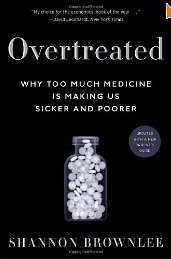February 18th, 2011 by Michael Kirsch, M.D. in Book Reviews, Opinion
No Comments »

 My daughter, Elana, home from college on winter break, offered me a book to peruse from one of her classes. She correctly suspected that her father, the MD Whistleblower, would enjoy reading a book authored by a whistleblower pro.
My daughter, Elana, home from college on winter break, offered me a book to peruse from one of her classes. She correctly suspected that her father, the MD Whistleblower, would enjoy reading a book authored by a whistleblower pro.
The book, “Overtreated: Why Too Much Medicine Is Making Us Sicker and Poorer” by Shannon Brownlee should be required reading for first year medical students, who have not yet acquired views and habits that promulgate excessive medical care and treatment. For those of us already in practice, this book should be a required element of board recertification.
Brownlee understands the medical system well and describes a culture of excess, conflicts of interests, absence of universal quality control mechanisms and fractured and disorganized care with no one in charge of a particular patient. She presents some chilling anecdotes of medical tragedies that have occurred at our most prestigious medical institutions. And she introduces us to reform leaders who understand the system’s inherent deficiencies and their proposals to remedy them.
Brownlee states that explanations for waste in the healthcare system include:
- Cost of a gargantuan bureaucracy
- Medical malpractice fear and defensive medicine
- Incentives for patients with medical insurance to overutilize care
- Rising medical costs
The most important cause, she argues, is unnecessary medical care, which costs the nations hundreds of billions of dollars and exposes patients to the risk of harm from medical complications. She writes, “If overtreatment were a disease, there would be a patient advocacy group out there raising money for a cure.” Read more »
*This blog post was originally published at MD Whistleblower*
June 23rd, 2010 by DrRob in Better Health Network, Health Policy, Opinion, True Stories
No Comments »

He came in for his regular blood pressure and cholesterol check. On the review of systems sheet he circled “depression.”
“I see you circled depression,” I said after dealing with his routine problems. “What’s up?”
“I don’t think I am actually clinically depressed, but I’ve just been finding it harder to get going recently,” he responded. “I can force myself to do things, but I’ve never have had to force myself.”
“I noticed that you retired recently. Do you think that has something to do with your depression?” I asked.
“I’m not really sure. I don’t feel like it makes me depressed. I was definitely happy to stop going to work.”
I have taken care of him for many years, and know him to be a solid guy. “I have seen this in a lot in men who retire. They think it’s going to be good to rest, and it is for the first few months. But after a while, the novelty wears off and they feel directionless. They don’t want to spend the rest of their lives entertaining themselves or completing the ‘honey do’ list, but they don’t want to go back to work either.”
He looked up and me, “Yeah, I guess that sounds like me.” Read more »
*This blog post was originally published at ACP Internist*
June 2nd, 2010 by GarySchwitzer in Better Health Network, Health Policy, News, Opinion, Research
No Comments »

A couple of health journalism gems you shouldn’t miss just because they were published over the holiday weekend:
Natasha Singer of the New York Times had an important piece, “When Patients Meet Online, Are There Side Effects?,” about privacy concerns when social networking sites like CureTogether.com and PatientsLikeMe.com offer online communities for patients and collect members’ health data for research purposes.
John Fauber of the Milwaukee Journal-Sentinel published another in his “Side Effects” series on conflicts of interest in healthcare. This one was about doctors vouching for the drug Multaq for treating atrial fibrillation without ever having seen all of the data.
The Minneapolis Star Tribune began a “Too Much Medicine” series. Health editor Dave Hage informs that they’ve been working on this project for nearly a year with plans for a few more installments in coming months, each covering different ailments and procedures that are over-used or under-proven. (Unfortunately, I think the series is only available in the print editions.)
*This blog post was originally published at Gary Schwitzer's HealthNewsReview Blog*
 My daughter, Elana, home from college on winter break, offered me a book to peruse from one of her classes. She correctly suspected that her father, the MD Whistleblower, would enjoy reading a book authored by a whistleblower pro.
My daughter, Elana, home from college on winter break, offered me a book to peruse from one of her classes. She correctly suspected that her father, the MD Whistleblower, would enjoy reading a book authored by a whistleblower pro.












